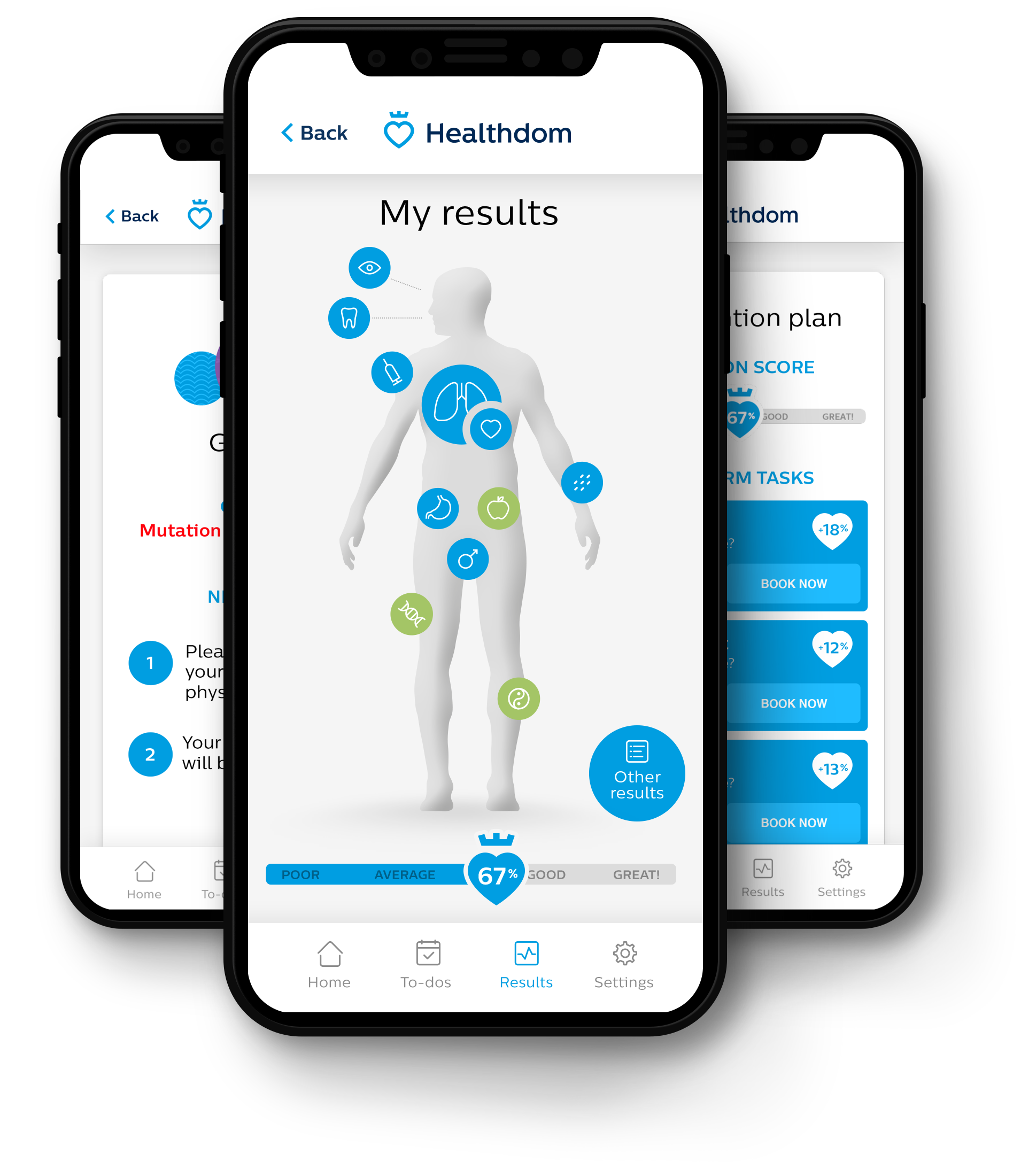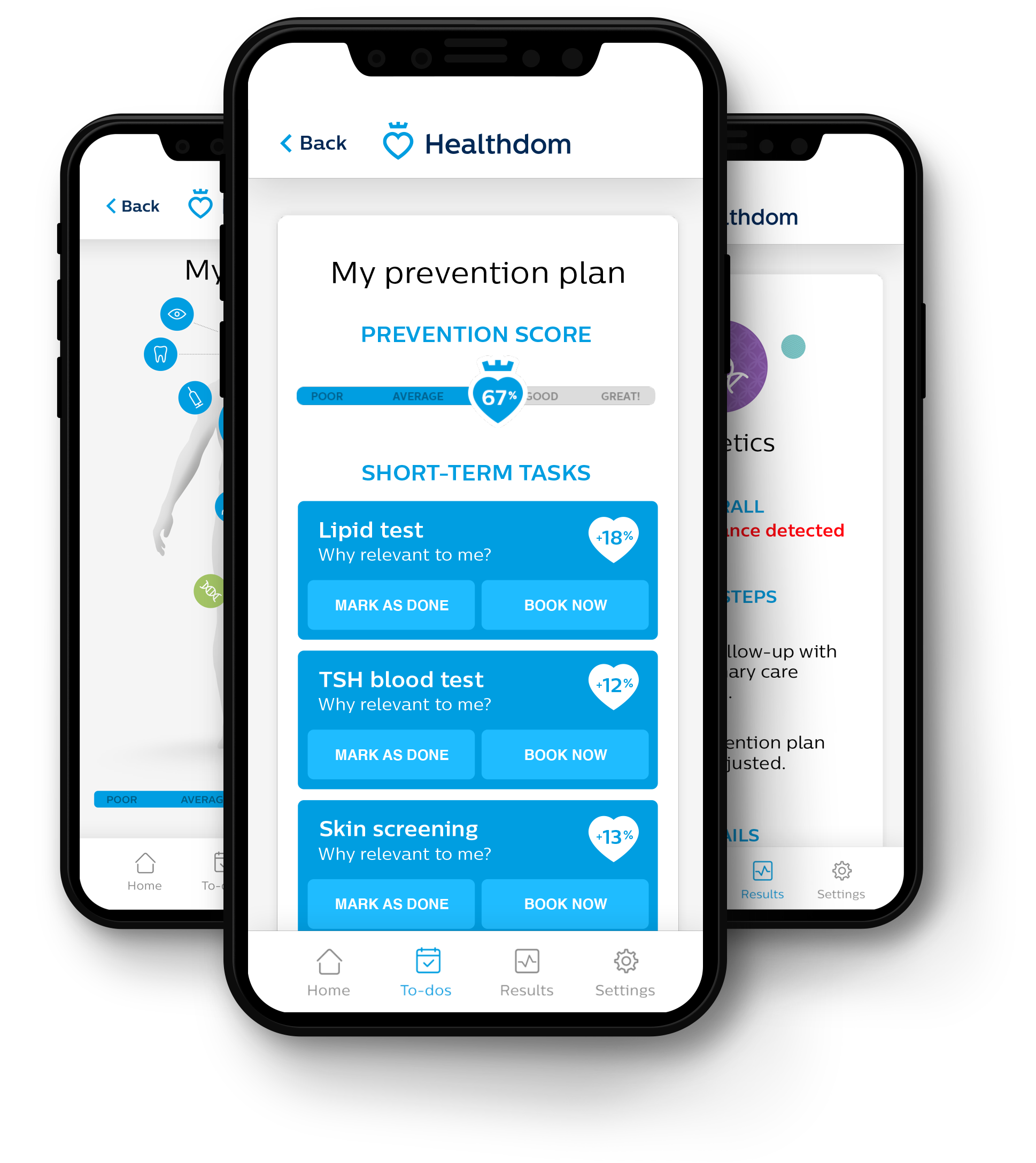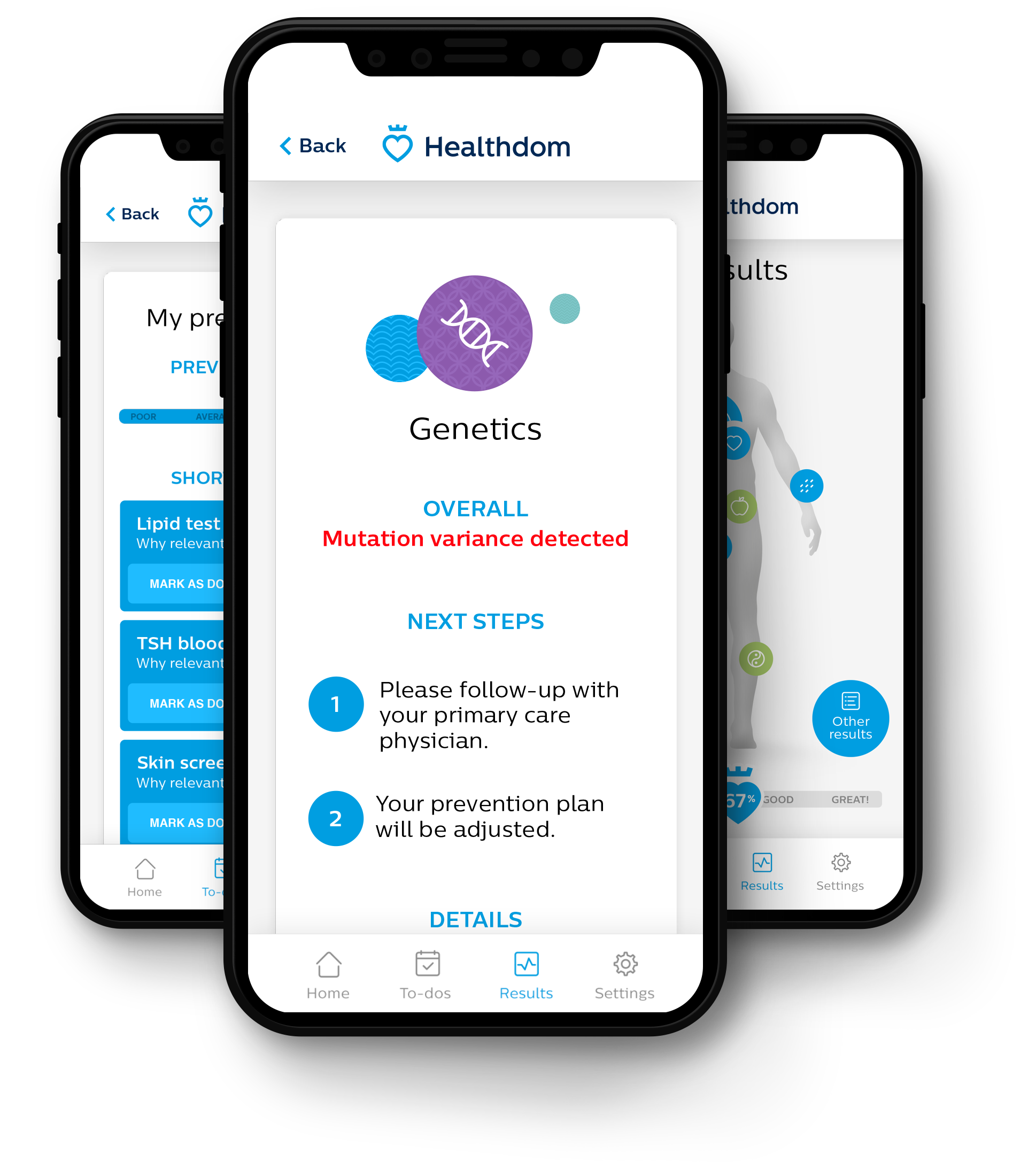
Preventive health simplified
Healthdom helps prevent illness by providing you with personalized screenings and check-up plans based on your DNA, wearables, lifestyle and medical history.
Sign up todayAre you protecting the life you love and staying healthy?
The current healthcare system is reactive and complex. Be proactive today to prevent problems down the road.
Avoid those problems by right screenings at the right time and healthier lifestyle.
How well are you protecting your health?
Free assessment within 5 minutes
Getting started is easy and free
Just follow these three simple steps:
1. Take health assessment and DNA test
Short online health risk assessment (~5 min) and optional DNA test to get a deep understanding of your health determinants.
2. Discover your health action plan
Instantly receive 360° analysis including benchmarks around your health. Within 24 hours get an individualized plan with a score of how well you are protecting your health.
3. Enjoy simplified management of your health
Centralize your medical records, manage your health-related tasks and optimize your screening schedule.
see more…
Effortlessly stay on top of your health,
securely and affordably
Cut through the noise
Our team of medical experts and professionals have carefully curated the content to simplify medical jargon. Our recommendations are strictly based on well-established medical guidelines. You can find sources to all our recommendations and content within the product. We believe in transparency and clearly explain why a recommendation is relevant to you.
Working along with your doctor
Typically, doctors spend 10-min or less with a patient during a visit. Healthdom gives you additional leverage and resources to organize all your screenings and tests so that when you are with your doctor, you can spend time more effectively. We complement your physician visit with additional prevention methods (e.g. genomics and behavioral data), to ensure comprehensive health management.


Low-cost prevention
The US Affordable Care Act makes the majority of preventive tests free, and Healthdom helps you access this benefit. For tests that are not free, we provide access to the most affordable provider so that you can save.
Minimizing health deterioration through awareness
We understand that your health data is highly personal and private. Healthdom uses industry-standard security and encryption method to protect your data. We are HIPAA (Health Insurance Portability and Accountability Act ) compliant and do not share your individual-level information with any third-party without your explicit consent. Additionally, we will delete your individual health data from our systems if you ever request it.
Effortlessly stay on top of your health,
securely and affordably

Cut through the noise
Our team of medical experts and professionals have carefully curated the content to simplify medical jargon. Our recommendations are strictly based on well-established medical guidelines. You can find sources to all our recommendations and content within the product. We believe in transparency and clearly explain why a recommendation is relevant to you.
Working along with your doctor
Typically, doctors spend 10-min or less with a patient during a visit. Healthdom gives you additional leverage and resources to organize all your screenings and tests so that when you are with your doctor, you can spend time more effectively. We complement your physician visit with additional prevention methods (e.g. genomics and behavioral data), to ensure comprehensive health management.
Low-cost prevention
The US Affordable Care Act makes the majority of preventive tests free, and Healthdom helps you access this benefit. For tests that are not free, we provide access to the most affordable provider so that you can save.
Minimizing health deterioration through awareness
We understand that your health data is highly personal and private. Healthdom uses industry-standard security and encryption method to protect your data. We are HIPAA (Health Insurance Portability and Accountability Act ) compliant and do not share your individual-level information with any third-party without your explicit consent. Additionally, we will delete your individual health data from our systems if you ever request it.
Examples of how Healthdom
can help you
Increasing your chances against breast cancer
If you are a woman with a BRCA1/2 gene mutation (which indicates breast cancer susceptibility) you might not know about it until the cancer is advanced. With Healthdom, you might learn about the mutation early and get a recommendation for increased monitoring. This early detection could lead to your best chances of successful treatment.Triggering diet change based on DNA test
If you had hemochromatosis (too much iron in the blood) you might not know it until later in life. But by that time, the damage done might be irreversible and result in liver cirrhosis. Healthdom might discover the disease upfront, suggesting that you change your diet and start regular phlebotomy, which can help you lead a normal life.Reducing colorectal cancer risk
If you have a family history of colorectal cancer, you would most likely postpone preventive colonoscopies until you were 55. But for some people, 55 is too late, and cancer might already develop. If your family history survey shows hereditary risk, the Healthdom algorithm would prompt you to get tested much earlier, giving you the option for early care. Our news
Examples of how Healthdom
can help you
Increasing your chances against breast cancer
If you are a woman with a BRCA1/2 gene mutation (which indicates breast cancer susceptibility) you might not know about it until the cancer is advanced. With Healthdom, you might learn about the mutation early and get a recommendation for increased monitoring. This early detection could lead to your best chances of successful treatment.
Triggering diet change based on DNA test
If you had hemochromatosis (too much iron in the blood) you might not know it until later in life. But by that time, the damage done might be irreversible and result in liver cirrhosis. Healthdom might discover the disease upfront, suggesting that you change your diet and start regular phlebotomy, which can help you lead a normal life.
Reducing colorectal cancer risk
If you have a family history of colorectal cancer, you would most likely postpone preventive colonoscopies until you were 55. But for some people, 55 is too late, and cancer might already develop. If your family history survey shows hereditary risk, the Healthdom algorithm would prompt you to get tested much earlier, giving you the option for early care. Our news
Our news
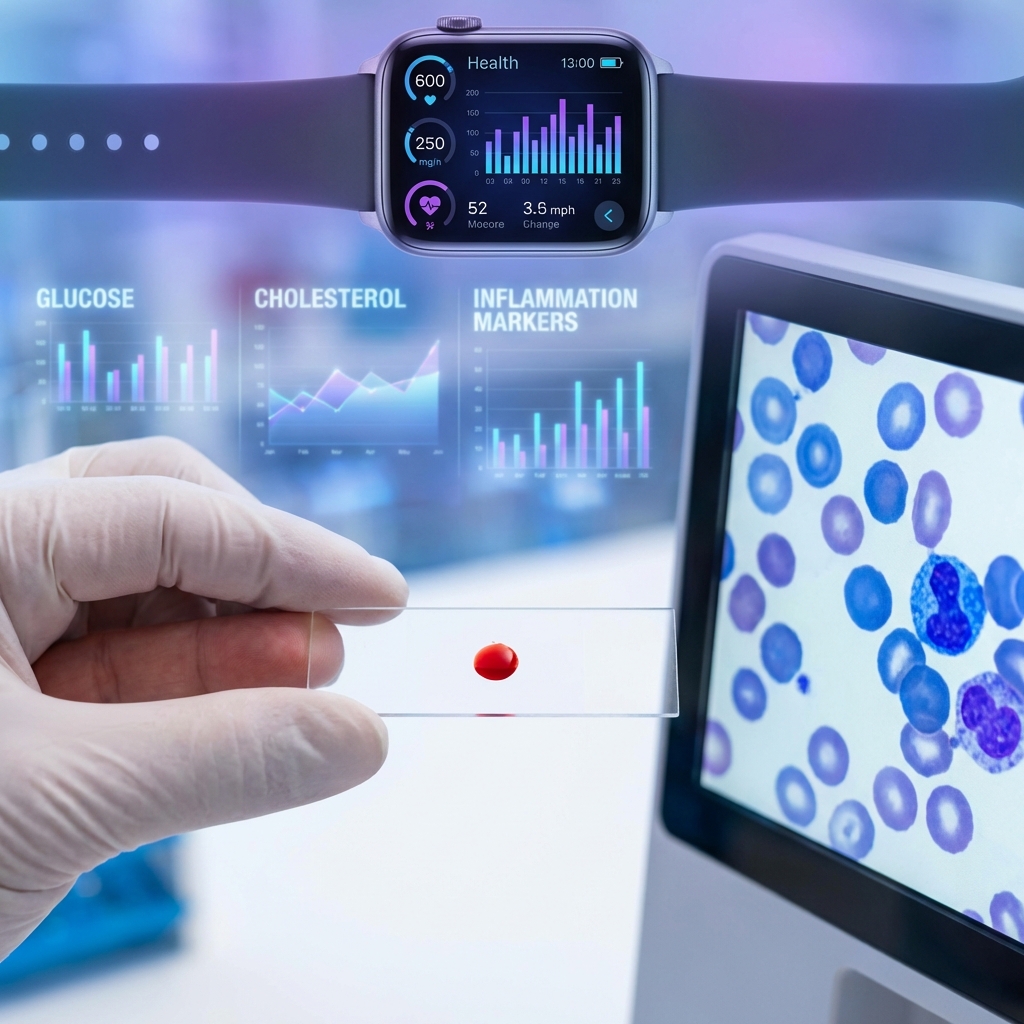
Advanced Biomarkers: The Genomic and Proteomic Frontier of Preventive Diagnostics
The traditional annual physical, with its standard lipid panel and basic metabolic screen, is a relic of 20th-century medicine designed to detect established disease states rather than prevent them. In the era of Health 3.0, diagnostics have shifted from reactive pathology to proactive optimization. We now possess the technological capability…
01/23/2026

Do You Often Wake Up at 3 AM? This Health Issue Could Be the Reason
Middle of the night, and you’re awake again? You open your eyes and glance at the clock, only to see it’s 3 AM once more. How is it possible that you wake up so frequently at precisely this time and can’t fall back asleep? The explanation is simpler than you…
12/08/2025
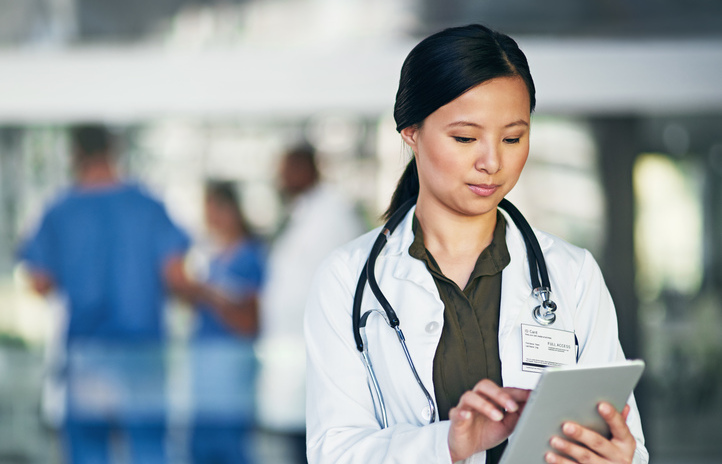
What is wrong with Modern Medicine?
The best doctors, the best treatments, and the best healthcare facilities in the world, and yet the modern healthcare system in US is still broken. Because of the issues within the healthcare system, many people don’t receive the right care at the right time. One of the biggest problems with…
11/18/2025

Advanced Biomarkers: The Genomic and Proteomic Frontier of Preventive Diagnostics
The traditional annual physical, with its standard lipid panel and basic metabolic screen, is a relic of 20th-century medicine designed to detect established disease states rather than prevent them. In the era of Health 3.0, diagnostics have shifted from reactive pathology to proactive optimization. We now possess the technological capability…
01/23/2026

Do You Often Wake Up at 3 AM? This Health Issue Could Be the Reason
Middle of the night, and you’re awake again? You open your eyes and glance at the clock, only to see it’s 3 AM once more. How is it possible that you wake up so frequently at precisely this time and can’t fall back asleep? The explanation is simpler than you…
12/08/2025

What is wrong with Modern Medicine?
The best doctors, the best treatments, and the best healthcare facilities in the world, and yet the modern healthcare system in US is still broken. Because of the issues within the healthcare system, many people don’t receive the right care at the right time. One of the biggest problems with…
11/18/2025
